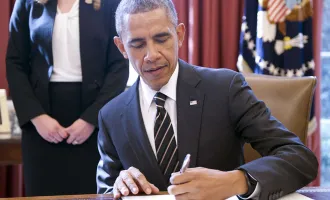
This Date in UCSF History: Battle Over The Supreme Court
Originally published in Synapse on December 8, 2005.
Following the withdrawal of Harriet Myers’ nomination for Supreme Court justice, President George W. Bush was faced with a choice: to select a conservative or moderate nominee. His selection of conservative-leaning Samuel Alito, a 15-year federal appellate court judge, demonstrated the desire to cater to the conservative branch of his party.
The question remains, though, if this selection will ultimately result in a reshaping of the Supreme Court to one that has a conservative character. Ultimately, it will come down to a series of factors that determine if Alito passes the Senate Judicial Committee.
Alito was born in Trenton, N.J. in 1950. He grew up a lifelong Phillies fan and even had a baseball card of himself made at one of their* fantasy fan camps. He graduated from Princeton in 1972 and received his law degree from Yale in 1975.
During the 1970s and 1980s, Alito served in a variety of government positions. He served as an assistant U.S. attorney for the District of New Jersey (1977-81), assistant to the solicitor general in the Department of Justice in Washington (1981-85), deputy assistant attorney general (1985-87) and as U.S. attorney for the District of New Jersey (1987-1990).
From 1990-2005, he served as a Court of Appeals’ judge for the Third Circuit, following his appointment by the first President Bush. The first red flag over Alito has risen over recently released documents from his time in the Reagan administration.
In memos concerning two state cases about restrictions on abortion, he counseled the Reagan administration to position itself in a direction that could lead to the dismantling of Roe v. Wade, the case that legalized abortion in the United States. Alito’s memos have raised concern in the Senate about any rulings on abortion he might make on the Supreme Court.
The second question to consider is if Alito has been able to separate his conservative, anti-abortion views from his judicial decision-making. On this account, his actions are mixed. In 1991, he was the main dissenter in a state court decision that was appealed to the Supreme Court in the form of Planned Parenthood v. Casey.
This case confirmed the right of women in Pennsylvania to obtain abortions without their husband’s approval and overruled the Pennsylvania state legislature’s attempt to have the husband involved in the decision. Alito’s dissent was linked to a recognition that the state legislature had allowed for women to be able to avoid gaining consent due to difficult circumstance. His siding with the concept of “legislative intent” is an item that has made him a favorite in conservative circles.
However, in 2000 he sided with the majority in ruling against a New Jersey law that banned late-term abortions. Thus, it is still not clear if his own personal opinions on abortion are separated from his decision-making.
Another factor, to consider is how his nomination may reshape the Supreme Court. Currently, the Supreme Court is reviewing the case of Ayotte v. Planned Parenthood. This case deals with a New Jersey law that requires 48-hour notification of parents prior to an abortion for a minor.
The wild card in this case is the new Supreme Court Chief Justice, John Roberts. He does not have a distinctive record on abortion and this case is a real test to determine how he will side with the abortion debate. The Senate will pay attention, as an anti-Roe ruling by the Roberts’s court could result in the court swinging towards the right. This may influence whether an even more conservative nominee would win confirmation by the Senate.
Additionally, the Senate Democrats are in a tenuous position. The American public does not necessarily want to see Roe v. Wade overturned, but there is also a sentiment for restrictions to be in place. Thus, the Democrats would like to avoid pushing too hard on the abortion issue in Alito’s hearings, as it could cost them politically in the midterm 2006 elections.
With the lack of a coherent position on the Iraq War, the Democrats cannot afford to take political gambles that could cost them a chance at House and Senate seats in 2006. With all these factors in play, the main factor that arises is how Alito cannot utilize his belief system in a court case on abortion.
The possibility that the Supreme Court could swing to the right via Roberts and even more the right with the addition of Alito is a possibility that the nation cannot afford. Although the presence of Alito on the court does not guarantee an overruling of Roe, it could potentially result in cases that erode it.
This would send the United States to the pre-Roe days, in which tough restrictions on abortions led to pregnant women utilizing unproven and medically unsound abortion techniques. The specter of back-alley abortions led California voters to recently oppose a parental notification abortion law; this same specter is a distinct possibility with passage of Alito to the court.
This image is the reason that pro-choice groups such as NARAL and Planned Parenthood have come out against him. Additionally, his nomination process will be chaired by Senator Arlen Specter (R-Pennsylvania), who will grill him over his views on abortion. Thus, Bush’s attempt to reshape the court in a conservative image could have a negative impact on the future of women’s health and should be opposed.



